The General Election takes place Nov. 3, and as we put together our plan to cover local elections, we thought it was time to share our Editorial Ethics Policy with you — right here in the newsletter.
First things first. Though we’re a staff of people with individual backgrounds, views, and personalities, we will remain unbiased in our reporting to support productive conversations around our growing community. Our goal has been, and continues to be, getting you all of the need-to-know information you need to begin your day in Charleston.
Here’s a breakdown of what we’ll continue to include in our newsletter, per our Editorial Ethics Policy. ⬇️
- Facilitation of positive dialogue around locally relevant conversations
- Broad diversity of thought (local content you might not typically find in your Facebook News Feed)
- Accreditation + links to attribute resources and build credibility
- Healthy dialogue around growing city topics including infrastructure, tourism, housing, diversity and inclusion, economic development, non-profits, sustainability, budget, connectivity, public safety, and more
- An invitation for everyone to participate in conversations
We refrain from indicating personal or brand preference on the following topics (along with any topic deemed controversial or highly politicized on a national level) to avoid bias or perceived bias: politics, religion, sexuality, entitlements, and gun control.
When these topics have a direct local impact, we strive to provide only factual information to inform our readers about their local relevance.
As this concerns upcoming elections, we will educate and activate our community with unbiased information to encourage individual voter participation. (I.e. vote for whoever + whatever you want to, just make sure to vote. 🗳️)
In our newsletter, you will find resources like:
- How and where to vote (everything from registration to the polls)
- Who’s running (you’ll want to know which candidates are in your district)
- Understanding elected positions (like what a councilperson does)
- Balanced coverage of local candidates (that’s right, only local candidates)
- Minimal coverage of candidates (with direct links to resources for each candidate)
- Notice that a national candidate is visiting or an associated event is happening locally (so you can avoid the traffic, or attend if you’re interested)
- Results (that’s right, we’ll be sure to let you know who wins or what passes)
You won’t find political advertising, endorsements, opinions or other bias.
At the end of the day, we believe in a healthy and productive dialogue around growing city topics and believe that by educating you, our lovely readers, on how you can proactively participate in conversations, we can activate you to participate in a manner that has the best long-term outcome for our community as a whole.
Question











